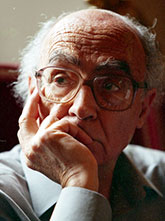José Saramago
Critique • Works • Views and quotes
Born
Azinhaga, Santarém, Portugal, 1922
Died
Tías, Canary Islands, Spain, 2010
Publications
Novels, plays, stories, memoirs
Writing language
Portuguese
Literature
• Baltasar and Blimunda (1982)
• The Year of the Death of Ricardo Reis (1985)
• Blindness (1995)
Novels
• Baltasar and Blimunda (1982)
• The Year of the Death of Ricardo Reis (1985)
• Blindness (1995)
Portuguese Literature
• Baltasar and Blimunda (1982)
• The Year of the Death of Ricardo Reis (1985)
• The Stone Raft (1986)
• The History of the Siege of Lisbon (1989)
• Blindness (1995)
• Seeing (2004)
• Cain (2009)
Literary Fiction
• Baltasar and Blimunda (1982)
On books, writers and writing
1998
Now I can clearly see those who were my life-masters, those who most intensively taught me the hard work of living, those dozens of characters from my novels and plays that right now I see marching past before my eyes, those men and women of paper and ink, those people I believed I was guiding as I the narrator chose according to my whim, obedient to my will as an author, like articulated puppets whose actions could have no more effect on me than the burden and the tension of the strings I moved them with....
Here comes a man whose left hand was taken in war and a woman who came to this world with the mysterious power of seeing what lies beyond people’s skin. His name is Baltazar Mateus and his nickname Seven-Suns; she is known as Blimunda and also, later, as Seven-Moons because it is written that where there is a sun there will have to be a moon and that only the conjoined and harmonious presence of the one and the other will, through love, make earth habitable. There also approaches a Jesuit priest called Bartolomeu who invented a machine capable of going up to the sky and flying with no other fuel than the human will, the will which, people say, can do anything, the will that could not, or did not know how to, or until today did not want to, be the sun and the moon of simple kindness or of even simpler respect. These three Portuguese fools from the eighteenth century, in a time and country where superstition and the fires of the Inquisition flourished, where vanity and the megalomania of a king raised a convent, a palace and a basilica which would amaze the outside world, if that world, in a very unlikely supposition, had eyes enough to see Portugal, eyes like Blimunda’s, eyes to see what was hidden…. Here also comes a crowd of thousands and thousands of men with dirty and callused hands, exhausted bodies after having lifted year after year, stone-by-stone, the implacable convent walls, the huge palace rooms, the columns and pilasters, the airy belfries, the basilica dome suspended over empty space. The sounds we hear are from Domenico Scarlatti’s harpsichord, and he doesn’t quite know if he is supposed to be laughing or crying…. This is the story of Baltazar and Blimunda, a book where the apprentice author, thanks to what had long ago been taught to him in his grandparents’ Jerónimo’s and Josefa’s time, managed to write some similar words not without poetry: “Besides women’s talk, dreams are what hold the world in its orbit. But it is also dreams that crown it with moons, that’s why the sky is the splendour in men’s heads, unless men’s heads are the one and only sky.” So be it....
Blind. The apprentice thought, "we are blind", and he sat down and wrote Blindness to remind those who might read it that we pervert reason when we humiliate life, that human dignity is insulted every day by the powerful of our world, that the universal lie has replaced the plural truths, that man stopped respecting himself when he lost the respect due to his fellow-creatures. Then the apprentice, as if trying to exorcise the monsters generated by the blindness of reason, started writing the simplest of all stories: one person is looking for another, because he has realised that life has nothing more important to demand from a human being. The book is called All the Names. Unwritten, all our names are there. The names of the living and the names of the dead.
I conclude. The voice that read these pages wished to be the echo of the conjoined voices of my characters. I don’t have, as it were, more voice than the voices they had.
Nobel Lecture, Dec. 7
On human rights
1998
In this half-century, obviously governments have not morally done for human rights all that they should. The injustices multiply, the inequalities get worse, the ignorance grows, the misery expands. This same schizophrenic humanity that has the capacity to send instruments to a planet to study the composition of its rocks can with indifference note the deaths of millions of people from starvation. To go to Mars seems more easy than going to the neighbour. Nobody performs her or his duties. Governments do not, because they do not know, they are not able or they do not wish, or because they are not permitted by those who effectively govern the world: The multinational and pluricontinental companies whose power—absolutely non-democratic—reduce to next to nothing what is left of the ideal of democracy. We citizens are not fulfilling our duties either. Let us think that no human rights will exist without symmetry of the duties that correspond to them. It is not to be expected that governments in the next fifty years will do it. Let us common citizens therefore speak up. With the same vehemence as when we demanded our rights, let us demand responsibility over our duties. Perhaps the world could turn a little better.
Nobel Banquet Speech, Dec. 10.


